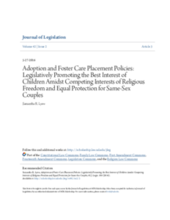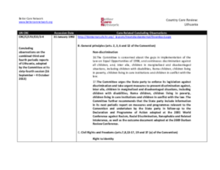Displaying 401 - 410 of 660
The purpose of this research is to provide an initial validation of a revision of the Transracial Adoption Parenting Scale—Revised (TAPS-R) with international transracial adoptive parents.
Establishing the context of this study of adoptive parenthood and open adoption, MacDonald describes the legal, policy, and social frameworks that shape the experience of adoptive parenthood. The role of adoption in child welfare policy is identified, specifically in the UK and USA where it provides permanence for significant numbers of children in State care.
The present study focused on whether parenting and family factors explain variance in cognitive and linguistic catch-up in children adopted internationally.
This study investigated the widely-used but under-researched program for training resource parents (i.e., foster, adoptive, or kinship parents) known as preservice PRIDE (Parent Resources for Information, Development and Education). The sample consisted of 174 participants in Ontario, Canada.
This report provides preliminary estimates of U.S. Adoption and Foster Care Analysis and Reporting System (AFCARS) data for Fiscal Year 2015.
The purpose of this article is to provide psychologists and adoption researchers with a conceptual model for the psychosocial adjustment of foster care adoptees with a background of maltreatment.
This article examines adoption and foster care placement policies as they pertain to the competing interests of religious freedom and equal protection for same-sex couples.
This country care review includes the care-related Concluding Observations adopted by the Committee on the Rights of the Child and the Committee on the Rights of Persons with Disabilities.
This country care review includes the Concluding Observations for the Committee on the Rights of the Child and the Committee on the Rights of Persons with Disabilities.
This brochure outlines adoption policy and procedure in Zambia, including a definition of adoption, how it works, its limitations, requirements for adopting a child, and other conditions.





